CHAPTER NINE
The Names of Buddhas
________________________________________
Commentary:
Originally all Buddhas had ten thousand names each, but because no one could remember so many, the names were reduced to one thousand each. Since that was still too many to be remembered by most people, the names were further simplified to one hundred, which were reduced still further to ten. These Ten Designations, common to all Buddhas, were explained in Chapter Four. I will refresh your memory by reviewing the names once again. They are, the Thus Come One, the One Worthy of Offerings, the One of Right and Equal Enlightenment, the One Perfect in Clarity and Conduct, the Well-Gone-Forth One, the Unsurpassed Scholar Who Comprehends the World, the Valiant Tamer and Guide, the Master of Gods and Men, the Buddha, and the World-Honored One.
Sutra:
At that time Earth Store Bodhisattva Mahasattva, said to the Buddha, “World-Honored One, I shall now perform a profitable and beneficial act for the sake of living beings of the future, so that they may obtain great help and benefit in the midst of life and death. Please, World-Honored One, hear my words.”
The Buddha told Earth Store Bodhisattva, “With your great compassion you now wish to undertake the inconceivable task of rescuing all those in the Six Paths who suffer for their offenses. The time is just right, speak quickly, for I am about to enter nirvana. You should complete this vow soon so that I have no need to be concerned for living beings of the present or future.”
Earth Store Bodhisattva said to the Buddha, “In the past, numberless asamkhyeyas of aeons ago, a Buddha named Limitless Body Thus Come One appeared in the world. If a man or woman hears this Buddha’s name and suddenly gives rise to a thought of respect, that person will overstep the heavy offenses of forty aeons of birth and death. How much more will he be able to do this if he sculpts or paints this Buddha’s image, or praises and makes offerings to him. The merit of this is limitless and unbounded.”
Commentary:
Here is a famous story concerning the practice discussed in the preceding text:
One day when Sakyamuni Buddha was not at the Jeta Grove but a number of his disciples, all Arhats, were, a musty old man who wished to leave home came to the grove. The Arhats took an immediate dislike to the old fellow because, when they used their powers of investigation, they saw that within eighty-thousand great aeons he had not planted a single good root. Consequently they did not allow him to go forth from home to the homeless life. You see, it is not a simple matter to leave the home life. It is said, “Do not declare leaving home an easy thing to do; throughout many lives, Bodhi must be planted.”
The old man, who must have been a good ninety or a hundred years old, had no possessions at all, not even clothes or food, and perhaps he thought that he might be able to come by these things if he left home. After being turned down by the Buddha’s disciples, he hobbled along the road leading away from the grove and headed for the Ganges River, where he planned to end it all.
As he stood on the river bank about to drown himself, the Buddha, whom he did not recognize by sight, came walking along and said, “Old man, aren’t you a bit old for swimming?”
The man replied, “I intend to commit suicide, since all I wanted to do was leave home and cultivate, but the Buddha’s disciples would not allow me to do so. If I did now, perhaps I’ll get to be a young man in my next life and be able to leave home. As it is, the Buddha’s disciples don’t seem to like people like me, and decides, I’m so shriveled and ugly with age that people can’t even stand to look at me.”
The Buddha then disclosed his identity and offered to accept the old man as a disciple. They returned to the Jeta Grove where the Buddha spoke Dharma and the old man certified to the fruit of Arhatship, a phenomenon that was not all rare during the Buddha’s lifetime. A number of senior Arhats objected that the old man couldn’t have attained Arhatship because he did not have any good roots, but the Buddha corrected them. “You know only what can be found within eighty thousand great aeons, but beyond that you know nothing. You are like people inside a house who are able to see everything within the walls but nothing outside them. Over eighty thousand aeons ago, this old man was a firewood-gatherer who met a tiger in the mountain wilds one day. Frightened, he exclaimed ‘Namo Buddha,’ and as a result of that single sentence he is able to leave home life now.” If people have not recited a great many Namo Buddha’s in the past, they will not be able to leave home life in the present.
Sutra:
“Again, in the past, as many aeons ago as there are grains of sand in the Ganges River, a Buddha named Jewel Nature appeared in the world. If a man or woman hears the name of this Buddha and in the space of a finger-snap decides to take refuge, it will be eternally impossible to turn that person from the unsurpassed path.”
“Again, in the past, a Buddha named Padma-Victory Thus Come One appeared in the world. If a man or woman hears this Buddha’s name, or if the name merely passes by his or her ear, that person will attain one thousand births in the Six Desire Heavens. How much more will this be true if he or she sincerely recites the name of that Thus Come One.”
Commentary:
Padma is the name of the red lotus flower, the supreme and unsurpassed lotus. If one merely hears the name Padma Victory Thus Come One he will be reborn in the Six Desire Heavens that were discussed earlier. Since merely hearing the name has such great merit, reciting it certainly has even more.
A man once went to Pratimoksa Monastery and plucked an exquisitely beautiful golden-colored flower from a tree and offered it before the image of Sakyamuni Buddha. He then asked an old man in the temple how much merit he had derived from his offering. He was told that he would have to ask someone who had left home if he wanted to get the answer. He then asked a bhiksu how much merit had been derived from his offering, and was told that he would have to ask someone who had cultivated dhyana samadhi and reached the stage of Arhatship if he wanted to get the answer. He then sought out and found an Arhat to whom he put the same question. The Arhat contemplated and investigated the matter for him, and saw that the merit from this offering totally filled eighty thousand aeons and was still unbounded. Since he could not know any further than eighty thousand kalpas, he told the man that he would have to ask Sakyamuni Buddha himself. The Buddha replied that the merit from his offering a single flower totally filled empty space to the end of the Dharma-realm.
Sutra:
“Again, in the past, indescribable asamkhyeyas of aeons ago, a Buddha named Lion Roar Thus Come One appeared in the world. If a man or woman hears this Buddha’s name and single-mindedly takes refuge, that person will encounter numberless Buddhas, who will rub his or her crown and bestow predictions of enlightenment upon the individual.”
“Again, in the past, a Buddha named Krakucchanda appeared in the world. If a man or woman hears this Buddha’s name and sincerely beholds, worships, or praises him, that person will be the Great Brahma King in the assemblies of the one thousand Buddhas of the Auspicious Aeon, and will there receive a lofty prediction.”
“Again, in the past, a Buddha named Vipasin appeared in the world. If a man or woman hears this Buddha’s name, that person will eternally avoid falling into the Evil Paths, will always be born among men and gods, and will receive supremely wonderful bliss.”
“Again, in the past, as man aeons ago as there are grains of sand in limitless and boundless numbers of Ganges Rivers, a Buddha named Jeweled Victory appeared in the world. If a man or woman hears this Buddha’s name, that person will never again fall into the Evil Paths and will eternally dwell in the heavens, where he or she will receive supremely wonderful bliss.”
“Again, in the past, a Buddha named Jeweled Appearance Thus Come One appeared in the world. If a man or woman hears this Buddha’s name and gives rise to a thought of respect, that person will before long attain the fruit of Arhatship.”
Commentary:
Krakucchanda means both “victorious contemplation” and “manifold contemplation.” When the text says that by merely hearing or reciting the names of these Buddhas beings will not fall into the states of woe, it is important to realize that this means that we must stop doing evil. If after hearing these names we continue to do wrong, it is still possible to fall into the hells. People who say that now that they have heard the Buddha’s name they are sure to avoid the hells, and use this as an excuse to commit murder and arson and indulge in all sorts of antisocial behavior, will fall nonetheless.
Sutra:
“Again, limitless asamkhyeyas of aeons ago, a Buddha named Kasaya Banner Thus Come One appeared in the world. If a man or woman hears this Buddha’s name, that person will overcome the offenses of birth and death for one hundred aeons.”
“Again, in the past, a Buddha named Great Penetration Mountain King Thus Come One appeared in the world. If a man or woman hears this Buddha’s name, that person will encounter as many Buddhas as there are grains of sand in the Ganges, who will speak Dharma for him, and he will certainly realize Bodhi.”
“Again, in the past, there were Buddhas named Pure Moon Buddha, Mountain King Buddha, Wise Victory Buddha, Pure Name King Buddha, Accomplished Wisdom Buddha, Unsurpassed Buddha, Wonderful Sound Buddha, Full Moon Buddha, Moon Face Buddha, and other such indescribable Buddhas. World-Honored One, living beings of the present and future, both gods and humans, men and women, will obtain limitless meritorious virtues by merely reciting one Buddha’s name. How much the more if they recite many names. In birth and death all these living beings will obtain great benefit and ultimately will not fall into the Evil Paths.”
“If even one person in a dying person’s family loudly recites on Buddha’s name for the sake of the dying person, that dying one will quickly be freed from all karmic offenses except the uninterrupted retribution of the Five Offenses. The Five Offenses warranting uninterrupted retribution are so extremely heavy that one who commits them should not escape retribution for myriads of aeons. If, however, at the time of the offender’s death, another person recites the names of Buddhas on his behalf, his offenses can be gradually wiped away. How much more will this be true for living beings who recited those names themselves. The merit thus attained is limitless and eradicates numberless offenses.”
End of Chapter 9
(Next: Chapter 10)
Monday, July 21, 2008
Subscribe to:
Post Comments (Atom)











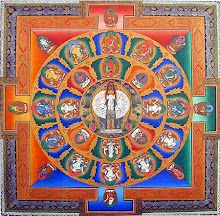




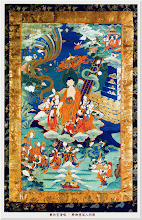

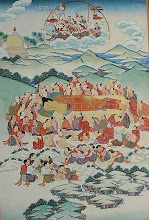


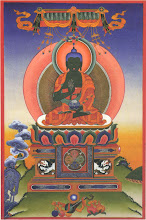




.jpg)

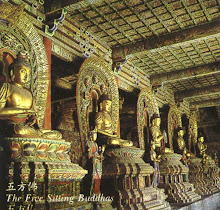













No comments:
Post a Comment